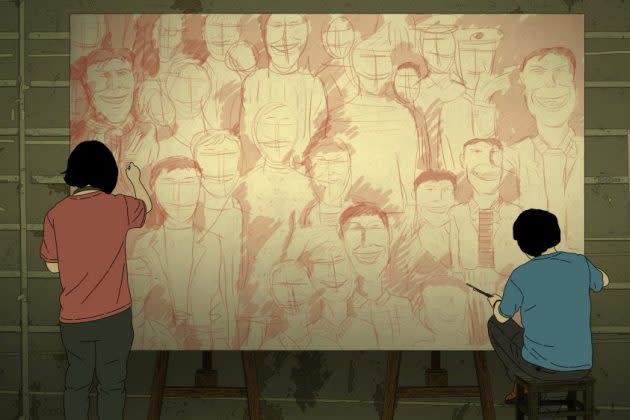‘Art College 1994’ Review: A Chinese Animation as Amiable but Directionless as Its Slacker Characters

The quote that opens Chinese director Liu Jian’s shaggy but amiable new animated feature is instructive. “To live, to err, to fall, to triumph, to recreate life out of life” is a passage from James Joyce’s “A Portrait of the Artist as a Young Man,” and indeed, Liu was himself at art college as a young man in the early ’90s, when and where “Art College 1994” is, unsurprisingly, set. The quasi-memoir feel to the movie does have its charm — it’s always a kick to see animation techniques applied not to extravagant flights of fancy but to slices of real, ordinary life — but it’s also its chief flaw. In re-creating life out of life, Liu is quite successful; whether he makes it into drama is another question. Like its characters, “Art College 1994” gives the impression of having just too much time on its hands.
Liu’s drawing style is full of small pleasures, especially in the intricate backgrounds, which, as in his last Berlin title, “Have a Nice Day,” are where the detail lives. Against peeling-paint walls and bicycle-strewn alleyways, the characters are less defined: simple, colored 2-D outlines that are differentiated mainly by hairstyle and body shape. The fact that these figures are voiced by a stellar cast of Chinese personalities – including “Better Days” breakout Zhou Dongyu, Dong Zijian from “Mountains May Depart,” viral folk-rock sensation Ren Ke, internet comedian Papi Jiang, and revered directors Jia Zhangke and Bi Gan — is impressive, but also not something many outside China will recognize until the surprise of the closing credits.
More from Variety
There’s a slightly frustrating lack of a single point of view, in a narrative that favors first one, then another of a loosely linked group of peers. But initially, proceedings revolve around friends and collaborators Xiaojun (Dong Zijian) and Rabbit (Chizi), two students who, as the film begins, are working on what Rabbit declares to be the kind of masterpiece that will win them a major prize. A brief debate on the optics of accepting or refusing such awards then ensues, before they land on the very boom-China conclusion that they should “screw the prize, take the money.” But before they can put this pragmatic principle into action, Lin Weiguo (Bai Ke) — a rival student boasting the ultimate status symbol in a blond, blue-eyed American girlfriend — slashes the canvas. The tit-for-tat cycle of revenge for this act gives the film one of a plethora of occasional subplots.
The guys hang out often with part-time hairdresser and full-time art philosopher Zhao Youcai (Huang Bo), whose presence on campus is tolerated even though, despite multiple attempts, he has never been accepted. In the threesome’s cyclical conversations, sometimes joined by fellow students nicknamed mostly for their weight — Skinny Horse, Chubster, etc. — the meandering tone is set, especially by Youcai, who quickly emerges as the standard-bearer for this drifting stage of life, talking a big game about art, experiencing revelation after revelation about its purpose, but never actually making any.
As rounded individuals, despite less screen time, the two women in the guys’ orbit fare a little better. Hao Lili (beautifully voiced by Zhou Dongyu) is a soft-spoken bespectacled piano student with a hesitantly reciprocated crush on Xiaojun, but also a practical approach to her future that sees her encouraging the attentions of a much steadier if duller suitor. “Sooner or later, we all have to marry someone,” she sighs, to the horror of her more worldly best friend Gao Hong (MVP Papi Jiang, bringing a nice dose of down-to-earth wit), an aspiring singer appalled by Lili’s willingness to compromise. But a late exchange between Hong and Xiaojun, outside the nightclub where she now sings, is a delicate marker of how all these Linklater-esque slacker characters, by the end of the film, will have to accept new realities. Part of the process of growing up, after all, is realizing that there isn’t an infinite amount of time to make good on a romance, or rebel against your elders, or establish a career. Sometimes, it can actually be too late.
For those inclined to see Chinese culture as a fortress impenetrable to outsiders, the sheer relatability of these likably aimless young people, with their unthinking self-absorption and tendency to believe that every new thought of theirs is a brand-new object in the world, might be a small revelation. Their views are informed by the traditional Chinese arts they study but also by Marcel Duchamp and Henri Matisse as well as Kurt Cobain and Michael Jackson, whose posters bedeck dorm rooms and billboards alike. But if “Art College 1994” is a highly recognizable snapshot of the humdrum rhythms of striving, directionless early-20-something life, that’s also an issue for those among us who will most readily identify with it: Having lived through it all once, do we really want to spend two long hours doing so again?
Best of Variety
Sign up for Variety’s Newsletter. For the latest news, follow us on Facebook, Twitter, and Instagram.

